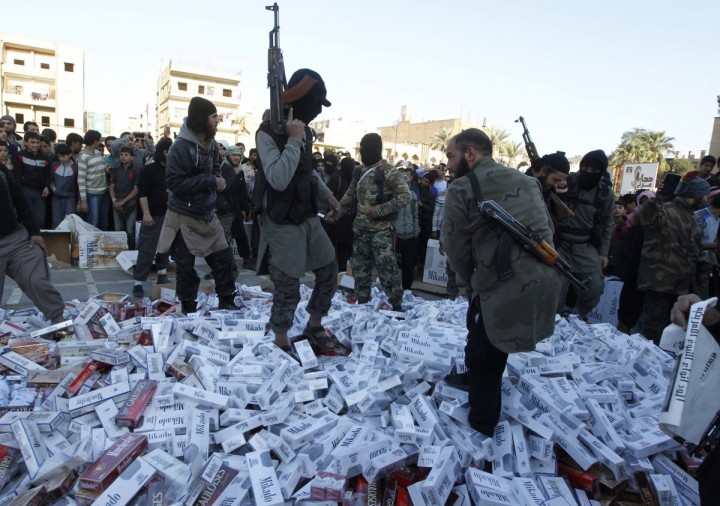
Nearly a year after Islamic State militants overtook Raqqa and established the city as their "headquarters," citizens are left suffering from widespread illness, food shortages, and acute poverty.
In January, ISIS released a warning to resident living in Raqqa, Syria's sixth-largest city, ordering them to vacate their homes or stay and face severe consequences. Within the following months, the city had become a central hub where ISIS militants gathered and dispatched to other battlegrounds across the country.
According to reports, Raqqa is today a city divided between insurgents, who live luxurious lives and enjoy access to private hospitals, and locals, who struggle to survive on a daily basis.
While citizens can no longer afford bread, as it has gone up in price 150% since September, ISIS fighters are paid a stipend of around twice as much as the average wage of Syrians in that part of the country.
However, the extremists refuse to share their wealth with the struggling locals.
"We have something here we call kitchen relief, like a soup kitchen, which gives one free meal a day to the people and has more than 1,000 families using it. Isis do not give this kitchen anything," said Abu Ibrahim Raqqawi, founder of a network of activists called Raqqa Is Being Slaughtered Silently
Beheadings are a common occurrence within Raqqa's Paradise Square, as well as frequent lashings for "crimes" such as smoking a cigarette. Journalists are not allowed to operate within the city under the threat of death.
"Isis kills a lot of people, we see a lot of executions, a lot of beheadings," said one activist who chose to remain anonymous.
"I have seen about five people crucified in the city. People are now calling Paradise Square Hell Square."
Abbu Muhammad, 25, added, "I can say that our people in Raqqa city are under the rule of a terrorist organization, who cut heads from bodies and keep them hanging in the streets, simply to terrorize the people of the city."
The Guardian reports that when warplanes belonging to President Bashar al-Assad killed scores of citizens last week, repeatedly targeting heavily populated areas of the city, ISIS and its battery of anti-aircraft and missile defenses refused to fire back, further angering Raqqa's residents against the insurgents
"People are getting very angry because ISIS do not shoot at the aircraft with their rockets, they just watch the people die. We have a situation where there are Syrian air strikes at the start of the day and coalition air strikes later and in between Isis is controlling and killing the people. Everybody is tired and afraid," said the activist.
Water has also become scarce, with some families forced to obtain it from the Euphrates river after coalition air strikes destroyed the oil refineries and power supply to the city's water pumps.
"The city is suffering from poverty and disease. A big problem is that all the prices inside the city have become very expensive especially after the coalition air strikes. There is no electricity, everyone is dependent totally on the generators," Raqqawi said.
"When coalition air strikes destroyed the oil refineries inside the city, prices grew threefold. The money that the people have is not enough to buy food, which has become very expensive."
ISIS militants and their families are also permitted to keep their generators permanently turned on while the rest of the city's residents are only allowed power for three hours a day.
Raqqa's civilians are "quickly dying off," added another activist, as patients are forced to stay in makeshift health clinics spread throughout the area while ISIS-only hospitals are provided with the best doctors and the latest equipment. Recently, the hospital's dialysis machines and incubators stopped working. The militants have refused to allow humanitarian aid to enter Raqqa, under the pretext that "they are from the infidels".
"People are dying from injuries because there is no medical equipment, no supplies, no doctors, no ambulance crews. ISIS have their own hospitals where they do not allow the civilians to go. These hospitals have the best medical treatment, the best doctors," the activist said.
The United Nations has estimated more than 100,000 people have died in the Syrian civil war, according to Reuters. Yet the Syrian Observatory for Human Rights said Tuesday that over 200,000 people have died, among them about 63,000 civilians, 45,000 Syrian troops and more than 50,000 rebel fighters.
However, the airstrikes, which began two months ago, have done little to weaken ISIS, Syrian President Bashar al-Assad told Paris Match on Wednesday, and said ground force must be used to properly disable the militant army.
"you can't end terrorism with aerial strikes," he said. "Troops on the ground that know the land and can react are essential."





















